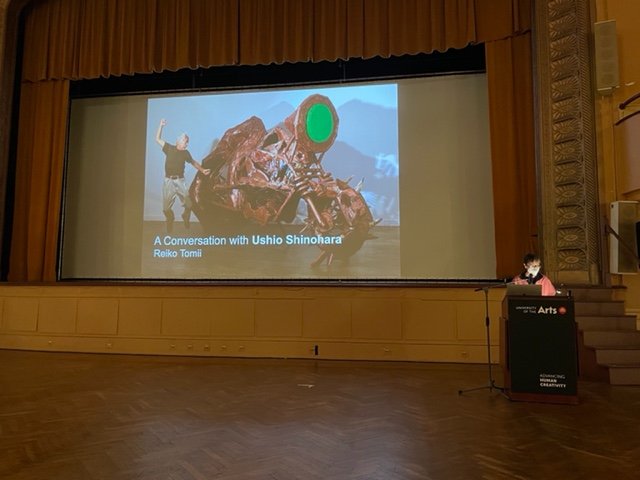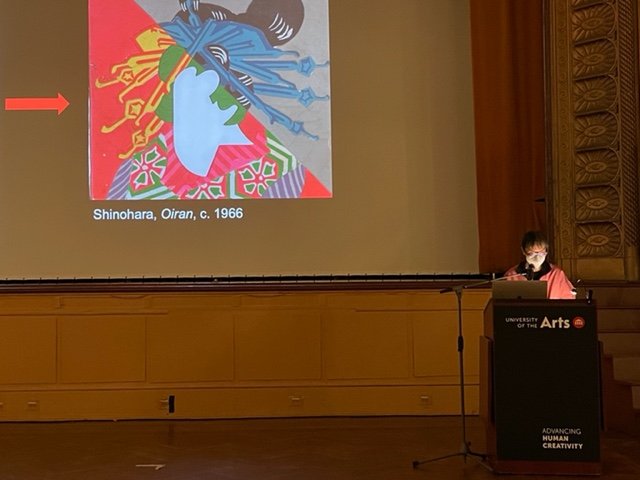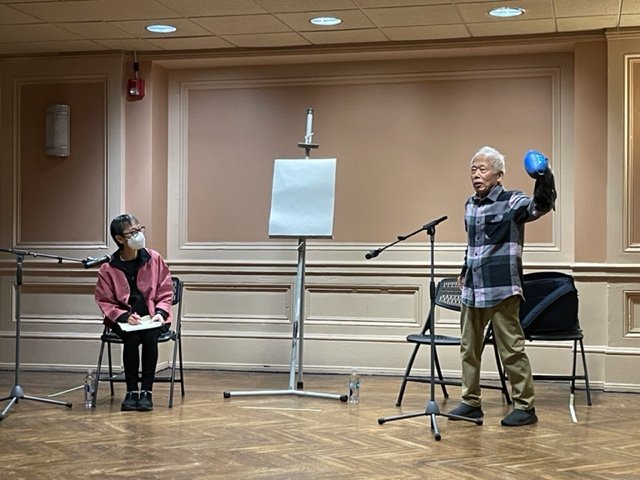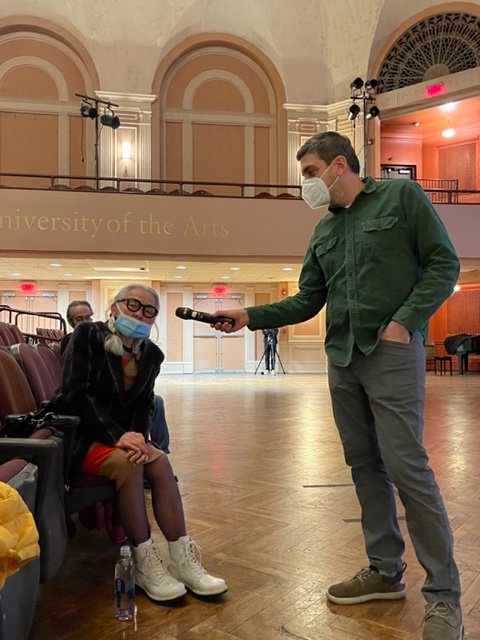Screening
Yōji Kuri: Art, Life and Opinions
Part of Japanese Experimental Animation: Recent Restorations Project
Friday, February 11th, 7pm
Lightbox Film Center
Special Guests Appearance: Ushio Shinohara in discussion with Reiko Tomii
CCJ is pleased to co-present with Lightbox Film Center three screening programs under the Japanese Experimental Animation project, curated by Go Hirasawa (2/19), Julian Ross (2/25), and Fusako Matsu (2/11). In this first screening, we are thrilled to collaborate with curator Fusako Matsu and the Yōji Kuri Studio to present works by Kuri. Further, we are excited to welcome Ushio Shinohara and Reiko Tomii for a special post-screening discussion about Shinohara’s interview by Kuri. We are grateful for the support from Ushio and Noriko Shinohara and the Arakawa + Gins The Reversible Destiny Foundation. This program is generously supported, in part, by Japan Foundation New York.
Yōji Kuri: Art, Life and Opinions
Yōji Kuri, Love, 1963, 5 min, color, sound, 35mm transferred to digital
Yōji Kuri, The Bathroom, 1972, 10 min, b/w, sound, 35mm transferred to digital
Yōji Kuri, Art, Life and Opinions: Shūsaku Arakawa (Arakawa Shūsaku no Geijutsu to Seikatsu to Iken), 1973, 20 min, b/w, sound, 16mm transferred to digital
Yōji Kuri, The Midnight Parasites (Kiseichū no ichiya), 1972, 10 min, color, sound, 35mm transferred to digital
Yōji Kuri, Art, Life and Opinions: Ushio Shinohara (Shinohara Ushio no Geijutsu to Seikatsu to Iken), 1973, 21 min, color, sound, 16mm transferred to digital
Screening Total: 66 min
Post-Screening Discussion with Ushio Shinohara and Reiko Tomii
Ushio Shinohara
Reiko Tomii, Photo © Daphne Youree
Curated by Fusako Matsu
In 1973, the animator Yōji Kuri released a series of short films documenting the internationally active artists Shūsaku Arakawa, Sawako Gōda, Ushio Shinohara, Nobuo Sekine, and Tadanori Yokoo. The series, titled Geijutsu to Seikatsu to Iken (Art, Life and Opinions), consists of one film per artist, each about 20 minutes in length. They are in a voiceover format, with artists’ narration superimposed on images of their art and footage of them working, each of them speaking about their work and the inspirations and cultural context of their practice.
The five short films in the Art, Life and Opinions series were first presented at a screening where the lineup also included animation by Kuri and the documentary Deutschland Dada (1969), by Helmut Herbst, dealing with the early days of German Dadaism. Deutschland Dada was described in official publicity materials for the screening as “a documentary work dealing with German Dadaist art circa 1898 [sic],” and the screening evidently intended to show parallels between the Dadaists and the five Japanese artists in Kuri’s films, all of whom were radically unconstrained by conventional values.
Interest in Dadaism was growing in Japan in 1960, the year Kuri began releasing animated works as a member of Three-Person Animation Circle (Animation 3-nin no Kai). The same year, the group Neo Dadaism Organizers was formed by artists including Shūsaku Arakawa and Ushio Shinohara, both of whom appear in Art, Life and Opinions.
The screening of works by Animation 3-nin no Kai was among the many projects conceived by Sōgetsu Art Center, a driving force in Japanese avant-garde art. After the screening at Sōgetsu, Kuri deepened ties with various musicians and artists, and he actively documented his contemporaries on the creative scene. Tarō Okamoto and Toshi Ichiyanagi make appearances in The Chair (1963), while the group Zero Jigen (Zero Dimension) appears in A Walnut in the Head (2007), made with footage Kuri had shot in the past.
This program will present his classic LOVE, as well as The Bathroom and The Midnight Parasites, which were shown for the first time at the initial screening event, “Art, Life and Opinions.” In the spirit of featuring recent digitizations, we are also pleased to present two titles out of the Art, Life and Opinions series: The Art, Life and Opinions of Shūsaku Arakawa and The Art, Life and Opinions of Ushio Shinohara. Further, we are very pleased to welcome Ushio Shinohara in person, to discuss the interview with art historian Reiko Tomii after the screening.




BIO:
Yōji Kuri was born in 1928 in Sabae, Fukui, Japan. He has been active in numerous fields including animation, manga, painting, illustration, sculpture, and fiction. He founded the animation studio Kuri Jikken Manga Kobo (Kuri Experimental Animation Studio) in 1960 and began producing works. The same year, Kuri, Ryohei Yanagihara, and Hiroshi Manabe formed Animation 3-nin no Kai (Three-Person Animation Circle) and organized Japan’s first experimental animation screening at Sōgetsu Art Center. The screening series was later rebranded as an “Animation Festival,” and became the country’s foundational festival of animation, screening works from both Japan and overseas.
Music by Kuniharu Akiyama, Toshi Ichiyanagi, Yoko Ono, Tōru Takemitsu and others was incorporated into Kuri’s animated films, and many works including his masterpiece Clap Vocalism won awards and were screened at film festivals around the world. In the early days of Japanese television, Kuri produced hundreds of animations for televised series such as 11PM, Minna no Uta (“Songs for Everyone”), and Hyokkori Hyotan Island, and he also appeared in many TV programs and commercials. He continues to paint and create animation today.
http://www.yojikuri.jp/
Ushio Shinohara (born 1932, Tokyo), nicknamed “Gyu-chan”, is a Japanese Anti-Art artist. He started his Boxing Painting in 1960 and resumed in 1991, having since performed it at many places. His exuberant, bright, large-scale paintings and sculptures have been collected and exhibited at prestigious institutions internationally, including Centre Georges Pompidou, Paris; the Metropolitan Museum of Art, New York; The Museum of Modern Art, New York; Tate Modern, London; Walker Art Center, Minneapolis; Dallas Museum of Art, Texas; the Philadelphia Museum of Art; Hiroshima City Museum of Contemporary Art; the National Museum of Art, Osaka; The National Museum of Modern Art, Tokyo; Anomaly Gallery, Tokyo; The Museum of Contemporary Art, Los Angeles; The Metropolitan Museum of Art, Seoul; the Samuel Dorsky Museum of Art, New York; Kariya City Art Museum, Aichi, among others. The documentary film Cutie and the Boxer, depicts the forty-year marriage of Ushio + Noriko Shinohara received a Director’s Award at Sundance Film Festival and nominated for The Academy Award. He performed three Boxing Paintings several weeks before his 90th birthday.
Reiko Tomii is an independent art historian and curator who investigates post-1945 Japanese art in global and local contexts for the narration of a world art history of modernisms. She is Co-Founder/Co-Director of PoNJA-GenKon, a scholarly listserv (www.ponja-genkon.net). Her recent publication Radicalism in the Wilderness: International Contemporaneity and 1960s Art in Japan (MIT Press, 2016), which received the 2017 Robert Motherwell Book Award, was turned into an exhibition Radicalism in the Wilderness: Japanese Artists in the Global 1960s at Japan Society Gallery in New York in 2019. In 2020, she received the Commissioner for Cultural Affairs Award from the Japanese government.
Fusako Matsu graduated from Musashino Art University, Moving Image Division, and currently researches photography and animation. Matsu leads the archives of Yõji Kuri and Taku Furukawa. Matsu has contributed “Animated MV, The Third Golden Age—Michael Patterson’s A-HA’s ‘Take On Me,’ AC part, Powder’s ‘New Tribe’” in ECRIT-O vol. 11. Matsu has co-authored Agnès Varda: Cinéaste of Love and Memory (Documentary Series) (Neoneo Magazine, 2021).
This program is generously supported, in part, by Japan Foundation New York and Pennsylvania COuncil on the Arts Preserving Diverse Cultures Program.
Japanese Experimental Animation: Recent Restorations Project
2/11, Yōji Kuri: Art, Life and Opinions
2/19, Ryōhei Yanagihara and Hiroshi Manabe: Out of Three-Person Animation Circle
2/25, Experiments in Flicker & Love
Grants from the Toshiba International Foundation and Pola Art Foundation received in spring 2021 allowed CCJ to conduct research and preservation projects related to Japanese experimental animation works. Two teams were formed: one on the works by the graphic designer Keiichi Tanaami, led by Ann Adachi-Tasch, scholar Julian Ross and archivist John Klacsmann; and another on the film materials at Sōgetsu Art Center archive, led by scholar Go Hirasawa and archivist Nobukazu Suzuki.
The outcomes of these projects were the new digitizations of She (1971) and Look at the Wood (1975) by Keiichi Tanaami and Sea Battle (Kaisen, 1960) by Ryōhei Yanagihara. Screening programs organized by Julian Ross and Go Hirasawa feature these newly digitized works as well as CCJ’s previous preservation project, Tanaami’s Human Events (Ningen Moyō, 1975). Ross’ program places Tanaami’s works in conversation with contemporary works, while Hirasawa’s program highlights two artists of the Three-Person Animation Circle (Animation 3-nin no Kai), a group formed at Sōgetsu Art Center by Yōji Kuri, Ryōhei Yanagihara, and Hiroshi Manabe. In Hirasawa’s program, we are delighted to present the premiere of the digitally restored version of Ryōhei Yanagihara’s Sea Battle (Kaisen, 1960).
In addition, we are pleased to welcome curator Fusako Matsu and the Yōji Kuri studio for a special presentation of Kuri’s animation and recently digitized works. Completing the Three-Person Animation Circle group members, this program features Yōji Kuri’s works around the “Art, Life and Opinions” screening event and the interview series under the same title. In this screening event on February 11th, we are very pleased to welcome special guests, artist Ushio Shinohara who was interviewed by Kuri as part of the series. He will speak in conversation with art historian Reiko Tomii.
Japanese Experimental Animation project is supported by the Toshiba International Foundation and the Pola Art Foundation.
Image: Still from Yōji Kuri, The Midnight Parasites (Kiseichū no ichiya), 1972, 10 min, color, sound, 35mm transferred to digital. ©️Yoji Kuri






